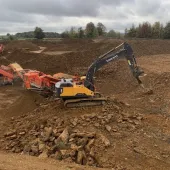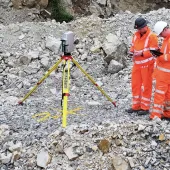Transitioning to 2042 and beyond

MPA emphasizes the need for early action to maintain essential minerals supply beyond 2042
THE need for early action to ensure a steady and adequate supply of essential minerals can be maintained beyond 2042 is highlighted in a new briefing published by the Mineral Products Association (MPA) today.
The Town & Country Planning (Minerals) Act 1981 introduced a provision to impose an end-date on all historic planning permissions for mineral working across Great Britain which were granted permission before February 1982 without a specified end-date. This was set at 22 February 2042, 60 years after the power came into effect.
The deadline applies to all historic mineral permissions and includes sand and gravel and crushed rock used to support construction activity, but also a wide range of minerals that are essential for the economy, including cement production, building stone, silica sand, industrial clays, and industrial lime.
The MPA briefing identifies that a significant number of mineral planning permissions and associated reserves will expire in 2042. Whilst some operations will have exhausted their reserves by then, particularly sand and gravel sites, many major rock and industrial mineral operations are likely to still contain commercially viable reserves at that time.
The importance of maintaining landbanks and productive capacity up to and beyond 2042 is further compounded by the long-term decline in the permitted reserve base, with mineral reserves continuing to being sold and consumed at a faster rate than they are being replaced, which has been the case for well over 10 years.
Mark Russell, the MPA’s executive director for planning and mineral resources, said: ‘Although the 2042 deadline may appear a long way off, in reality there is only a five-year window for government, mineral planning authorities, and industry to prepare the ground to ensure a steady and adequate supply of minerals can be maintained.
‘This is because it can take 10 to 15 years to identify and prove mineral resources, secure land and rights, prepare and submit planning applications, and for these to be determined and permissions issued.
‘Whether future mineral supplies are met by the re-consenting of existing reserves or through securing new and alternative reserves, the workload required to deliver the necessary casework over the next 20 years will be unprecedented.
‘All parts of the mineral planning process will, therefore, need to be properly resourced to ensure that sufficient applications are prepared and determined in a timely manner. There may also be the need for further policy guidance from central government and the devolved administrations.
‘Given the essentiality of mineral supply to the delivery of national ambitions for infrastructure and housing, whilst increasing our resilience to climate change and delivering net zero, it is vital that maintaining and replenishing supply to 2042 and beyond is addressed now.’
A copy of the 'Transitioning to 2042 and beyond to maintain essential minerals supply’ briefing can be downloaded here.









